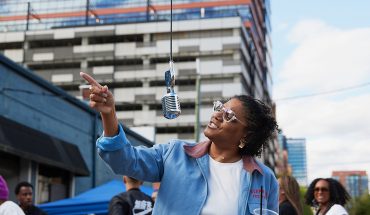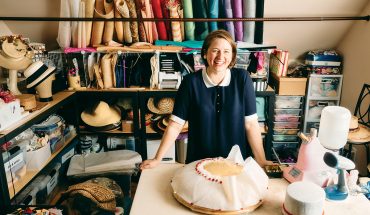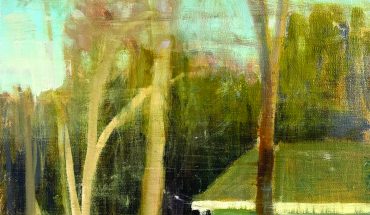
Some of the artists who have painted ceiling tiles include, from left: Bibi Bowman, Joyce Watkins King, Veronica Samuel, Amy Jo Edwards, Judy Stines.
by Todd Cohen
photographs by Carla Williams
Amy Jo Edwards was experiencing a crisis. Seated beside her husband at Rex Cancer Center in 2013 as he received his 20th round of chemotherapy in two years for colon cancer, Edwards was finding the personal challenge grueling, and the physical environment stifling.
“It was getting harder and harder,” says Edwards, a 25-year state government employee. “I was gripped with fear the whole time: What if it comes back? And I was staring at the ceiling into nothing. It was cold and empty.”
When she vented her emotions to Dawn Bell, a Greensboro artist, friend, and four-time cancer survivor, Bell told her that during her own chemotherapy treatment at Duke Cancer Center, she’d come up with a solution. After gazing endlessly at a blank ceiling from a reclining chair, she removed the ceiling tiles and painted them.
Inspired by Bell, Edwards created Healing Ceilings, an all-volunteer charity that enlists artists to paint ceiling tiles, then donates the tiles to cancer centers.
Since it began, the nonprofit has worked with more than 100 artists who have painted more than 300 tiles for seven cancer centers in Raleigh, Cary, Clayton and Smithfield. And it’s growing, with a new partnership in the works with a cancer clinic in Morehead City.
“It’s the closest I get to church,” says Edwards, who turns 54 in September. “It’s the most spiritually fulfilling thing I’ve ever done in my life.”
A Raleigh native who was born in the old Rex Hospital on Wade Avenue and graduated from North Carolina State University with a degree in English, Edwards’s day job is in administrative services for information technology in the state court system. She is married to Bill McConley, who is semi-retired after a career designing and building custom furniture and case goods for architects and the interior design industry.
They live in the Five Points neighborhood.
What has been your experience with illness?
I’ve been taking care of people with cancer my whole life, since about 5 years old. My mother is the youngest of 10. Her mother, and eight of the 10 children, either had cancer and died, or had cancer and survived.
How does Healing Ceilings work?
We don’t just give tiles to artists. I looked at hospital art across the country. I discovered a whole body of evidence-based design. We educate artists, and we travel to spread the word of our mission that art heals. Cancer patients who undergo exams and treatments spend a lot of time looking up at the ceiling. Research has proven that appropriate visual art can positively impact patient outcomes.
How much money has Healing Ceilings raised?
We’ve raised less than $2,000, and we’ve put in a little over $8,000 of our own money. We’re trying to raise money. For the first year, we need $25,000. It’s for the computer, to buy the tiles, and for travel to deliver and pick up the tiles. Bill has been home since his cancer. He does the shipping and handling. I do this at night and weekends.
Where did you grow up?
My dad, George C. Edwards, was from Nash County and was in the Army. We lived all over the country. He retired as state veterinarian of North Carolina. My mother, Alice Privette Edwards, was from Franklin County and was a homemaker.
What did you learn from them?
How to love and care for my community and my family. Perseverance. And don’t walk away from difficult times.
What is your earliest memory of philanthropy?
If you weren’t playing with your toys or had grown out of your clothes, they always went either to neighbors or families who needed them. My mother was always giving what she had, and my grandmother was the same way.
Who do you admire in Raleigh?
Lekita Essa (a certified health consultant and founder of Lekitacare; also the vice president of Healing Ceilings). Her huge heart. She taught me basically to never give up on believing in abundance, that what you need is always there.
What motivates you each day to do something to give back?
I feel like there’s a huge lack – for people who are in need – of being seen. When you are in crisis, you are invisible. People are afraid of death. I just feel like I have an obligation to love other people.
What do you like about Raleigh?
I am so proud of its rebirth. My parents always brought me back home to humble me and remind me of my roots, wherever we were living – in Seattle or Chicago or San Antonio. What I love about the town is that it’s still a small town where everyone knows everyone, but with a big city feel. There are things to do, places to go.
What inspires you?
Other people who keep trying.
What does philanthropy mean to you?
Giving what you have to others or to causes that don’t have it. Philanthropy is not just about money. You give what you have and you’re willing to give.
What do you do for fun?
I love to garden.
Where do you like to go for vacations?
I don’t remember when I had a vacation. Chemotherapy bills don’t allow for vacations.
What is your favorite movie?
Fantasia. I love going to other places, and it’s other worlds I’d like to live in, in my head.
What are you reading?
I’m re-reading Romeo and Juliet. My favorite quote since I was 13 is about love. Juliet says: “My bounty is as boundless as the sea, My love as deep; the more I give to thee, The more I have, for both are infinite.” That’s me.
What is a pet peeve?
Apathy.
What is your philosophy of life?
Love and be loved.
Where did you and your husband meet?
In 1984, on Harrington Street. He was working for William Cozart Antiques and going to the School of Design at N.C. State in architecture. We met through references. I remember the day. He was wearing black linen shoes, and carrying his portfolio case, and wearing a Stanley Blacker blazer he’d gotten from Goodwill. We got married in 1991 at Tucker House. My mother died of cancer the next Sunday.
You don’t have children?
We just have four-legged furry ones. The Third Place coffee shop is the center of our universe. I’m kind of known as Java Mama, or Aunt Amy Jo. My husband and I are there all the time. We get to know all the young people who are working there.
If you won the lottery, what good works would you do with the money?
Create a scholarship for mediocre students to go to whatever school they wanted to go to. You’re just a regular person and you need help just like everybody else does.




